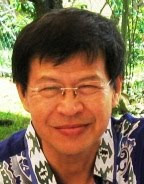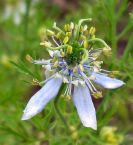
Everytime I go to a supermarket in Malaysia and grab a basket instead of a trolley, it always reminds me of those days when I spent my first 11 years of childhood in Singapore. At that time, I stayed with my parents at a rented wooden attap house in Kampung Bukit Kasita and went to Radin Mas School, where I studied from Standard One to Standard Five. My family was of course struggling at that time to make ends meet.
The basket in the supermarket reminds me of the cane basket that I used to carry when I had to walk for half a day after or before school, selling food to the public. If I went to school in the afternoon, then in the morning before sunrise, the kampung folks would be hearing a boy calling out "nasi lemak...nasi lemak...", sometimes louder than the sound of the "azan" (the call for prayer) from the local village mosque.
Yes, in those days (1951 to 1962), the village folks didn't have to go to a Malay or Mamak restaurant for their breakfast. Breakfast was literally brought to their doorsteps. All they had to do was to call out to the boy,"Hey, Nasi lemak, mari sini" (Hey Nasi lemak, come here...). The boy would then carry the basket of "nasi lemak" to the customer who would then purchased the quantity that he wanted that morning. At that time a packet of nasi lemak wrapped in banana leaves only cost ten cents. Now it costs from RM1.00 to RM1.50, depending on where you are in Malaysia. To know more about "nasi lemak" dish, please click here.
The nasi lemak made by my late mum was very popular and well-liked by the local village folks. It sold out so quickly that sometime I had to come back to the house to fill my baskets with more nasi lemak packs and went out again to finish my round of the village. You see, I had a fixed route which I took every morning with my baskets of nasi lemak. Normally there won't be any nasi lemak left by the time I finished my round of the kampung.
If I went to school in the morning, then I would go out to sell "epok-epok, mee Siam" and a few other Malay "kueh" like "seri muka and lepat pisang" in the afternoon. After I came back from school and had my lunch, my late mum would hand to me the two baskets containing the food to be sold that day. I carried a basket in each hand and with my right hand holding the bottle of mee Siam sauce, I began the journey in the afternoon to sell them to the Singapore town folks.
At that time the "karipap" of today was called "epok-epok". I don't know why the Malaysians called it "karipap" and not "epok-epok" and I have not been to Singapore for so long that I wonder whether Singaporeans still call it "epok-epok." "Karipap" as I understand it was originally made by the Sikhs or "Benggali" as we called them. It was a big-sized triangular-shape piece of food containing spicy curried potatoes wrapped with a layer of flour. It was deep fried until the flour skin became crispy.
The "karipap" of the Malays is also made of spicy curried potatoes and wrapped in the skin of flour and deep fried. However, the shape is different and the size is smaller.
"Mee Siam" was actually the fried mee-hoon that is normally found in Malaysia, except that "mee Siam" came with its own special sauce. I can't seem to find mee Siam in Malay restaurants nowadays.
So there I was carrying the two baskets and a bottle of sauce with my bare hands. Initially it was tough for me because of the hot afternoon sun and the heavy weight of the baskets which were fully laden with the food. But as it got towards evening, the sun's heat became more bearable and the baskets became lighter after the food were gradually sold to customers.
The route that I took was diffrent from the village route in the morning. Onr of my elder brothers (Rosli or Shariff) was covering the village route and I had to cover the town area. Selling at the town area was tougher than selling at the village. I had to cover a longer distance. Normally I returned to the house at about 5.00 pm after the baskets were empty . When I didn't return to the house by 7.00 pm, my late mum would know that I couldn't finish selling all the food yet and was trying to finish selling before returning home.
My late mum gave me twenty cents for every dollar of food sold. I used the money to save at the Post Office. What I did was to spend all my earnings to buy stamps from the local Post Office and then stick the stamps onto the Post Office book. Whatever amount contained in the stamps were considered as my savings. I wonder whether the same style of savings are still being practised in Singapore now. Come to think of it, I don't remember whether I managed to cash out my savings before I moved to Johor Bahru in 1963 :)
After my father moved to Johor Bahru in 1963, my elder brothers and I also stopped our "selling business". My late mum didn't tell us why it was stopped and my brothers and I didn't dare to ask her (in case she changed her mind about not selling...hehehe). I guess my father had a better pay and we didn't have to resort to the "selling business" again to augment the family's income.
In 1963 and 1964, I manged to concentrate on my studies and was among the students selected to study Form One at the Malay College in Kuala Kangsar, Perak. The basket, wherever I see or hold it, will always remind me of the "selling business" experience that I had in Singapore as a kid.






